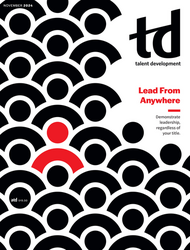TD Magazine Article
Is Unsolicited Data Collection Ethical?
Employees are only willing to share data under the right circumstances.
Fri Nov 01 2024

More than three-fourths of employees want to improve their experience at work. While that fact may not be a shock by itself, it may be surprising to learn the lengths to which workers are willing to go to enhance their environment.
According to Qualtrics's 2024 report, Building an Ethical and Effective Passive Employee Listening Program, 77 percent of 1,000 workers from Australia, France, Germany, Japan, Singapore, the UK, and the US are open to their employers analyzing their messages, calendars, and other communications to improve their experiences, such as their professional relationships, working conditions, interactions, and work culture.
It's part of a rising trend called passive employee listening, which taps into unsolicited employee data. Employees unconsciously generate data by doing normal, day-to-day actions such as declining a meeting, answering a question on a public forum, or emailing a customer.
"This research underscores the crucial dialogue needed between employers and employees in the evolving landscape of today's workplace," says Benjamin Granger, Qualtrics chief workplace psychologist, in a press release. "Good dialogue is two-way and employees appreciate opportunities to drive the conversation with senior leadership. Passive listening allows employees to raise topics that don't show up in employee surveys and open up new lines of communication."
Employees' biggest concern with the practice is the potential invasion of privacy. Despite more than three-quarters of workers expressing an openness to passive employee listening, more than half are still worried about privacy. The other top fears were data security and data misinterpretation.
Respondents indicated they are the least comfortable sharing social media data, especially anonymous platforms such as Reddit and Glassdoor and nonanonymous websites such as LinkedIn. "This is most likely due to employees' perceptions of intent, consent, and reciprocity from their employers looking at external channels," the report explains.
Comfort in passive listening practice also varies by employee level, with lower-level staff being the most wary. Less than one-third of individual contributors said they probably or definitely would opt in to a passive listening program. However, more than two-thirds of those in leadership roles said they would opt in.
To make employees more comfortable, the report encourages employers to build trust between workers and senior leadership. More than half of employees who trust their organization's leaders said they probably or definitely would share their data. Almost the same amount of respondents who don't trust their leaders would probably or definitely would not choose to share their data.
Companies that establish passive employee listening can assuage apprehension by being accountable to ethical principles. A cross-functioning ethics committee with oversight and influence over employee outcomes is an important step in forging trust.
You've Reached ATD Member-only Content
Become an ATD member to continue
Already a member?Sign In

